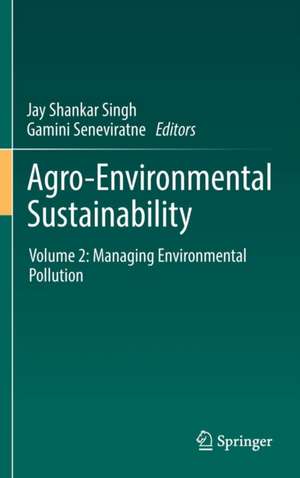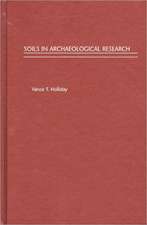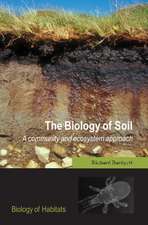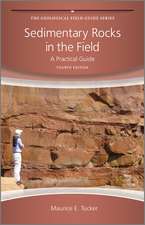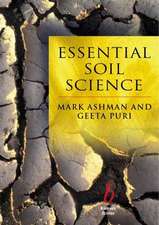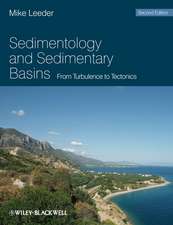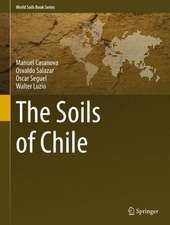Agro-Environmental Sustainability: Volume 2: Managing Environmental Pollution
Editat de Jay Shankar Singh, Gamini Seneviratneen Limba Engleză Hardback – 22 feb 2017
Traditional agricultural management techniques have relied heavily on application of chemical fertilizers and pesticides; and recent land use change practices have led to over exploitation of natural resources. Strategies outlined here simplify a complicated picture of the way microbial communities can improve the quality of environment and eliminate food scarcity in the coming generations. This work is a significant contribution to research in this increasingly important discipline of soil sciences, and will appeal to researchers in microbiology, agriculture, environmental sciences, and soil and crop sciences.
| Toate formatele și edițiile | Preț | Express |
|---|---|---|
| Paperback (2) | 639.25 lei 6-8 săpt. | |
| Springer International Publishing – 15 iul 2018 | 639.25 lei 6-8 săpt. | |
| Springer International Publishing – 17 iul 2018 | 642.18 lei 6-8 săpt. | |
| Hardback (2) | 645.47 lei 6-8 săpt. | |
| Springer International Publishing – 22 feb 2017 | 645.47 lei 6-8 săpt. | |
| Springer International Publishing – 28 feb 2017 | 648.42 lei 6-8 săpt. |
Preț: 645.47 lei
Preț vechi: 759.37 lei
-15% Nou
Puncte Express: 968
Preț estimativ în valută:
123.51€ • 129.30$ • 102.20£
123.51€ • 129.30$ • 102.20£
Carte tipărită la comandă
Livrare economică 05-19 aprilie
Preluare comenzi: 021 569.72.76
Specificații
ISBN-13: 9783319497266
ISBN-10: 331949726X
Pagini: 257
Ilustrații: XIII, 257 p. 25 illus., 16 illus. in color.
Dimensiuni: 155 x 235 x 16 mm
Greutate: 0.56 kg
Ediția:1st ed. 2017
Editura: Springer International Publishing
Colecția Springer
Locul publicării:Cham, Switzerland
ISBN-10: 331949726X
Pagini: 257
Ilustrații: XIII, 257 p. 25 illus., 16 illus. in color.
Dimensiuni: 155 x 235 x 16 mm
Greutate: 0.56 kg
Ediția:1st ed. 2017
Editura: Springer International Publishing
Colecția Springer
Locul publicării:Cham, Switzerland
Cuprins
Methanotrophs: An Emerging Bioremediation Tool Due to Unique Broad Substrate Enzyme Methane Monooxygenase.- Methanotrophs: Methane Mitigation, Bioremediation and Wastewater Treatment.- Prospects of Plant-Bacteria Interactions in Remediation of Metal Contaminated Soils.- Cyanoremediation: A Green-Clean Tool for Decontamination of Synthetic Pesticides from Agro- and Aquatic Ecosystems.- Aromatic Plant-Microbe Associations: A Sustainable Approach for Remediation of Polluted Soils.- Cyanobacteria-mediated bioremediation of heavy metals.- Biochar application in management of paddy crop production and methane mitigation.- Role of Rhizospheric Microbes in Heavy Metal Uptake in Metallophytes.- Role of Biosurfactants on Microbial Degradation of Oil Contaminated Soils.- Microbial Oxidation of Atmospheric Methane in Natural and Agricultural Upland Soils.- Microbial Mediated Lindane Bioremediation: A Cost Effective and Naturally Renewable Technology.- Wastewater Effluent Discharge: Impact on Human Health and Microbial Remediation.
Notă biografică
Dr. Jay Shankar Singh is an assistant professor in the Department of Environmental Microbiology at BB Ambedkar (Central University) in Lucknow, India.
Dr. Gamini Seneviratne is a research professor at the National Institute of Fundamental Studies in Kandy, Sri Lanka.
Textul de pe ultima copertă
This two-volume work is a testament to the increasing interest in the role of microbes in sustainable agriculture and food security. Advances in microbial technologies are explored in chapters dealing with topics such as plant-microbe interactions, rhizoremediation and cyanoremediation, and bio-immobilization. Volume II is a collection of research findings that invites readers to examine the application of microbes in pollution reduction, decontamination of agro- and aquatic ecosystems, and remediation of various toxic compounds. Highly readable entries attempt to close the knowledge gap between soil microbial associations and sustainable agriculture.
Traditional agricultural management techniques have relied heavily on application of chemical fertilizers and pesticides; and recent land use change practices have led to over exploitation of natural resources. Strategies outlined here simplify a complicated picture of the way microbial communities canimprove the quality of environment and eliminate food scarcity in the coming generations. This work is a significant contribution to research in this increasingly important discipline of soil sciences, and will appeal to researchers in microbiology, agriculture, environmental sciences, and soil and crop sciences.
Traditional agricultural management techniques have relied heavily on application of chemical fertilizers and pesticides; and recent land use change practices have led to over exploitation of natural resources. Strategies outlined here simplify a complicated picture of the way microbial communities canimprove the quality of environment and eliminate food scarcity in the coming generations. This work is a significant contribution to research in this increasingly important discipline of soil sciences, and will appeal to researchers in microbiology, agriculture, environmental sciences, and soil and crop sciences.
Caracteristici
Demonstrates the role of microbes in improving soil fertility and function Assists members of the crop and plant sciences community to keep abreast of the developments in microbial technologies Focuses on different ecological applications of microbial groups Includes supplementary material: sn.pub/extras
Recenzii
“This volume offers a lot of rational approaches that may help to improve and develop agricultural sustainability. This book is useful to students, teachers, and researchers in the disciplines of agricultural microbiology, biochemistry and biotechnology.” (Siddharth Boudh, Pankaj Chowdhary and Vishvas Hare, Environmental Earth Sciences, Vol. 78, 2019)
